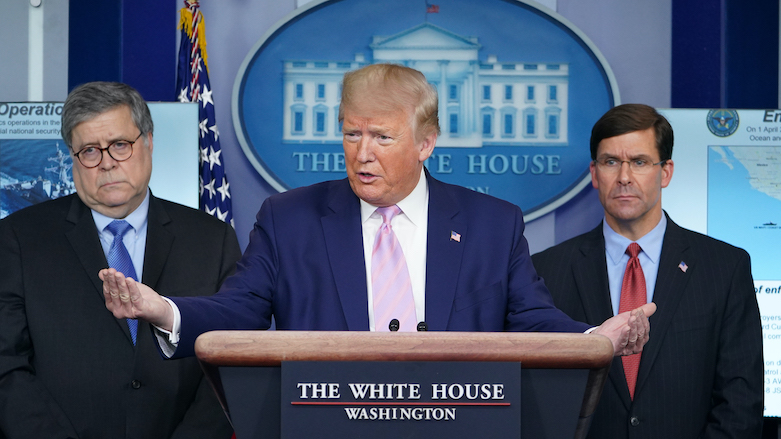Trump warns Iran against attacking Americans in Iraq

WASHINGTON DC (Kurdistan 24) – US President Donald Trump warned Iran against any attacks on US targets in Iraq, first in a tweet and then later in a press conference.
“Upon information and belief, Iran or its proxies are planning a sneak attack on U.S. troops and/or assets in Iraq,” Trump tweeted on Wednesday afternoon.
Trump’s tweet came just after he received an intelligence briefing at the White House, Fox News reported. US officials believe that “Iranian-backed proxies” are “planning the sneak attack” to which Trump referred, Fox said.
At a news conference later that day, which was primarily on the crisis caused by the coronavirus, Trump was asked about his tweet.
Trump affirmed his commitment to it. “If something bad happens,” he stated, “it’s going to be very painful for the other side.”
Secretary of Defense Mark Esper was also present at the briefing. He noted that despite Iran’s current difficulties, including with the coronavirus, “the Iranian regime continues to want to spread its malign activities throughout the region.”
In support of Trump’s warning, Esper added, “In one way, shape, or form,” Iran is “resourcing, directing, approving, of whatever operations for Shia militia groups in Iraq that are targeting American forces.”
The statements of Trump and Esper follow similar remarks by Secretary of State Mike Pompeo on Tuesday. Pompeo, too, held Iran responsible for the actions of the radical Shia militias, while he warned, “We will always respond to protect and defend Americans.”
The statements and warnings of the three senior US officials follow the US deployment of Patriot air defense missile batteries at two sites in Iraq: at al-Assad Air Base in western Iraq and at Erbil, where the US-led Coalition against the Islamic State also has a presence.
Read More: Coalition to continue Iraq operations, as Patriot missiles arrive, and base consolidation proceeds
At the same time, the Coalition has been repositioning its forces, moving them out of several smaller bases into fewer, larger bases.
US officials have explained that these moves were long-planned, and they are occurring because of the success of the Iraqi Security Forces and Peshmerga against the so-called Islamic State. But it is also the case that they provide for enhanced force protection.
A spate of earlier exchanges between the US and Iranian-backed forces in Iraq culminated in the Jan. 3 assassination of Qasim Soleimani, head of the Quds Force of Iran’s Islamic Revolutionary Guard Corps, followed by a Jan. 8 Iranian ballistic missile attack directed primarily at Al Asad Air Base in western Iraq.
A lull in hostilities followed. Indeed, less than a month ago, US officials believed the coronavirus pandemic, of which Iran is the Middle East’s epicenter, had caused Tehran to back off from confrontation, or so The Wall Street Journal reported.
Read More: US withdraws some troops as coronavirus reduces tensions with Iran
But almost immediately thereafter, an Iranian-backed militia, Kata’ib Hizbollah, launched a Katyusha rocket attack on the sprawling Taji military base, some 20 miles north of Baghdad. The assault killed two US soldiers and a British medic.
Read More: American, British soldiers killed in fresh rocket attack on Iraqi base
The US responded by attacking five weapons depots belonging to the militia. That, in turn, was followed by a second Katyusha attack on Taji, which caused Coalition casualties, but no fatalities.
The warnings to Iran from senior US officials reflect a renewal of tensions and reflect the view of US intelligence that further attacks are planned.
However, Col. Norvell DeAtkine (US Army, Retired), former director of Middle East Studies at the US Army’s John F. Kennedy Special Warfare Center and School at Ft. Bragg, suggested that there were important differences now, from the previous exchanges.
Noting the recent US measures – the installation of the Patriot missile batteries, as well as the consolidation of the Coalition presence in a fewer, bigger bases – DeAtkine suggested to Kurdistan 24 that Trump’s warning “had teeth behind it.”
The US is in a better position to respond to whatever the Iranians might be thinking of.
Indeed, DeAtkine noted that while the more radical Shia militias were using the US moves for propaganda purposes, claiming they showed how bad the US was, that it wanted to control Iraq, etc., he had been told that the leaders of those same militias had gone into hiding. “They don’t want to become the next Qasim Soleimani,” DeAtkine said.
Editing by Karzan Sulaivany
